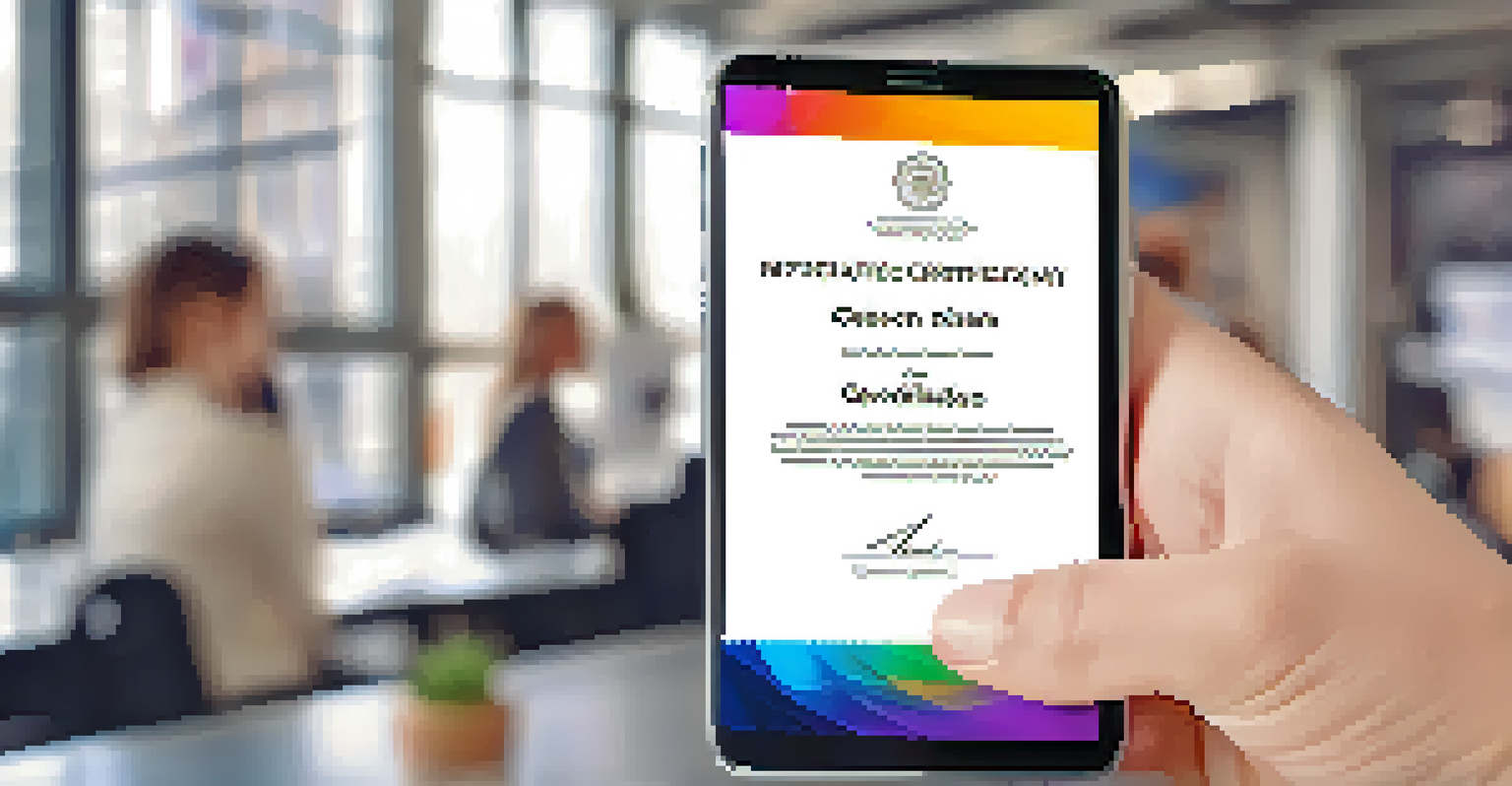The Role of NFTs in Issuing Digital Certificates for Graduates

Understanding NFTs: A Quick Overview
NFTs, or non-fungible tokens, are unique digital assets that represent ownership of a specific item or content on the blockchain. Unlike cryptocurrencies like Bitcoin, which are interchangeable, NFTs are one-of-a-kind and cannot be exchanged on a one-to-one basis. This uniqueness makes them particularly valuable for certifying achievements, such as educational credentials.
The future of education is not about the technology itself, but about how we use technology to enhance learning.
In the context of education, NFTs can serve as digital certificates that authenticate a graduate's accomplishments. When a student completes a course or program, an NFT can be created to represent that achievement, ensuring that it cannot be duplicated or forged. This technology provides a secure and transparent method of validating educational qualifications.
With the rise of online learning and digital credentials, NFTs offer an innovative solution for institutions and graduates alike. They not only enhance the credibility of educational certifications but also simplify the verification process for employers and other educational entities.
The Benefits of NFTs for Graduates
One of the primary benefits of using NFTs for digital certificates is their security. Since NFTs are stored on a blockchain, they are virtually tamper-proof, making it incredibly difficult for anyone to alter or forge a certificate. This security gives graduates peace of mind, knowing that their credentials are protected.

Another advantage is the ease of sharing these digital certificates. Graduates can easily showcase their accomplishments on various platforms, such as LinkedIn or personal websites, with just a few clicks. This instant accessibility can make a significant difference in job applications and networking opportunities.
NFTs Enhance Credential Security
NFTs provide a tamper-proof solution for digital certificates, ensuring that graduates' achievements are secure and verifiable.
Moreover, NFTs can also carry additional metadata, such as the skills acquired or the course content, providing a more comprehensive view of a graduate's qualifications. This enriched information can help potential employers better understand a candidate's expertise and fit for a role.
How Universities are Adopting NFTs
Many universities and educational institutions are exploring the integration of NFTs into their credentialing processes. By issuing NFTs as digital certificates, they can streamline the verification process and offer a modern approach to showcasing student achievements. This shift not only benefits graduates but also enhances the institution's reputation as a forward-thinking organization.
Technology is best when it brings people together.
For example, some universities have started pilot programs where students receive NFTs upon graduation or completion of specific courses. These tokens serve as a digital badge of honor, providing graduates with a unique and verifiable representation of their educational journey.
By adopting NFTs, institutions can also attract tech-savvy students who value innovation and digital solutions. This alignment with modern technology can help schools stand out in a competitive educational landscape and appeal to a broader audience.
Challenges of Implementing NFTs in Education
While the potential of NFTs in education is promising, there are also challenges that institutions must navigate. One major concern is the technological barrier; not all institutions have the resources or expertise to implement blockchain solutions effectively. This can create disparities between universities and hinder the widespread adoption of NFT technology.
Additionally, there are questions surrounding the environmental impact of blockchain technology. The energy consumption required for minting and trading NFTs has raised concerns about sustainability. Educational institutions must consider these factors when deciding to adopt NFTs as a solution for digital certificates.
Streamlined Sharing for Graduates
With NFTs, graduates can easily showcase their accomplishments on various platforms, enhancing their job application opportunities.
Furthermore, there is an ongoing need for clear regulations and standards in the NFT space. Without a streamlined framework, institutions may face legal and operational hurdles that complicate the implementation process. Addressing these challenges will be crucial for the successful integration of NFTs in educational credentialing.
The Future of Digital Certificates and NFTs
As technology continues to evolve, the future of digital certificates looks bright with NFTs at the forefront. There is a growing recognition of the need for secure, verifiable credentials in a world that increasingly relies on digital solutions. NFTs offer a glimpse into a future where educational achievements can be easily shared and authenticated.
In the coming years, we may see more educational institutions embracing the use of NFTs, leading to a standardization of digital certificates across the globe. This shift could revolutionize how we view and verify educational accomplishments, making it easier for graduates to showcase their skills and experiences.
Ultimately, the integration of NFTs into the educational landscape may foster a more connected and informed job market. With blockchain technology supporting secure and transparent credentials, both graduates and employers can benefit from a streamlined verification process that enhances the overall hiring experience.
Real-World Examples of NFT Digital Certificates
Several pioneering universities have already started issuing NFTs as digital certificates, setting the stage for a broader adoption across the educational sector. For instance, a prominent university launched an initiative that allows graduates to receive NFTs linked to their degrees, which can be easily shared and verified by employers.
Another example comes from a leading online learning platform that issues NFTs to students upon course completion. These tokens serve as proof of their newly acquired skills, allowing them to highlight their achievements in a visually appealing and verifiable way.
Universities Embrace NFT Technology
Educational institutions are adopting NFTs to modernize credentialing processes and appeal to tech-savvy students.
By showcasing these real-world examples, we can see how NFTs are not just theoretical concepts but practical solutions already making an impact. As more institutions recognize the benefits, the trend of using NFTs for digital certificates will likely gain momentum.
Conclusion: Embracing the NFT Revolution
In conclusion, NFTs represent a groundbreaking shift in how we issue and verify digital certificates for graduates. With their unique features, such as security and ease of sharing, NFTs offer an innovative solution to age-old challenges in credentialing. The benefits for both graduates and educational institutions are significant, paving the way for a more transparent and efficient verification process.
While challenges exist, the potential for NFTs to transform the educational landscape is undeniable. As technology advances and more institutions adopt these digital tokens, we can expect to see a new era of credential verification that aligns with the demands of a digital world.

Ultimately, embracing the NFT revolution could lead to a more connected and informed future, where graduates can proudly showcase their achievements with confidence. As we move forward, the integration of NFTs into education will be a key factor in shaping how we define and recognize success.